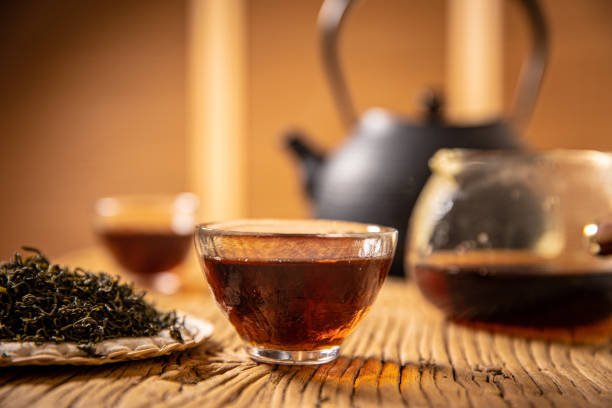Introduction to Pu-erh Tea
Pu-erh tea, a unique fermented tea from Yunnan, China, captivates tea enthusiasts with its deep, earthy flavors and complex character. Unlike other teas, Pu-erh undergoes a distinctive fermentation process, resulting in bold, rich profiles that range from smooth and woody to robust and mineral-like. Available in raw (sheng) and ripe (shou) varieties, Pu-erh is prized for its aging potential and cultural significance. With online tea stores making premium Pu-erh teas accessible, this blog explores their allure, benefits, brewing techniques, and tips for buying the best Pu-erh teas online.
What is Pu-erh Tea?
Pu-erh tea is a fermented tea made from the leaves of the Camellia sinensis plant, primarily grown in Yunnan, China. Its production involves either natural aging (raw/sheng) or accelerated fermentation (ripe/shou), creating distinct flavor profiles. Raw Pu-erh offers fresh, astringent notes that mellow with age, while ripe Pu-erh delivers smooth, earthy richness. With moderate caffeine (30-70 mg per 8 oz cup), Pu-erh provides a balanced energy boost. Available as loose leaf or compressed into cakes, bricks, or tuocha, Pu-erh is renowned for its depth and ability to improve with age, much like fine wine.
Why Buy Pu-erh Tea Online?
The rise of online tea stores has revolutionized access to Pu-erh tea, offering a wide selection of premium varieties from Yunnan’s finest tea estates. These platforms provide detailed sourcing information, customer reviews, and convenient delivery, making it easy to explore authentic Pu-erh from home. Online shopping allows tea enthusiasts to discover aged raw Pu-erh, artisanal ripe Pu-erh, or organic options, often with fair-trade certifications. The ability to compare flavor profiles, read brewing guides, and connect with Yunnan’s tea heritage enhances the experience, making online purchasing a gateway to this extraordinary tea.
Benefits of Pu-erh Tea
Pu-erh tea offers a range of benefits that enhance both the drinking experience and well-being:
- Rich Flavor: Earthy, woody, or mineral notes deliver a bold, evolving taste.
- Moderate Caffeine: Provides 30-70 mg per cup, ideal for sustained energy without overstimulation.
- Antioxidant Properties: Contains polyphenols that may support digestion and reduce oxidative stress.
- Aging Potential: Raw Pu-erh improves with age, offering a unique investment for tea collectors.
- Sustainability: Many Pu-erh teas are organic or fair-trade, supporting eco-friendly farming.
Buy Pu-erh tea online, as trusted retailers like Backyard Brew offer premium, organic selections sourced from Yunnan, ensuring authentic flavors and exceptional quality.
How to Choose the Best Pu-erh Tea Online
Selecting high-quality Pu-erh tea online requires careful consideration. Here are key tips to guide your purchase:
- Origin: Choose teas from Yunnan, China, particularly from regions like Xishuangbanna or Lincang for authenticity.
- Type: Select raw (sheng) for fresh, aging potential or ripe (shou) for smooth, earthy richness.
- Organic Certification: Opt for USDA or EU Organic certified teas to ensure purity and sustainable practices.
- Freshness or Age: For ripe Pu-erh, check for recent production; for raw, consider aged options for mellower flavors.
- Vendor Reputation: Select retailers with positive reviews and transparent sourcing, like Backyard Brew, for reliability.
- Packaging: Ensure teas are shipped in airtight, light-proof containers to preserve flavor, especially for loose leaf.
By prioritizing these factors, you can buy Pu-erh teas that deliver exceptional taste and align with your values.
Brewing the Perfect Cup of Pu-erh Tea
Brewing Pu-erh tea enhances its rich, complex flavors. Use 1-2 teaspoons of loose leaf tea or 5-7 grams of compressed Pu-erh per 8 oz of water, heated to 195-205°F (90-96°C). Rinse the leaves briefly with hot water to awaken them, then steep for 2-4 minutes for the first infusion—shorter for raw Pu-erh, longer for ripe. For gongfu-style brewing, use a gaiwan or small teapot, steeping for 10-30 seconds over multiple infusions (up to 10-15) to reveal evolving flavors. Pu-erh is best enjoyed plain to savor its depth, but a touch of honey can complement lighter varieties. For iced tea, brew double-strength and chill.
Storing Pu-erh Tea
To preserve Pu-erh tea’s freshness, store it in a breathable, airtight container in a cool, dry place with stable humidity, away from sunlight or strong odors. Raw Pu-erh benefits from aging in controlled conditions, while ripe Pu-erh is best consumed within a few years. Avoid plastic containers, which can trap moisture, and opt for ceramic jars or bamboo wrapping for compressed forms to maintain flavor and aroma.
Health Benefits of Pu-erh Tea
Pu-erh tea is renowned for its potential health benefits, driven by its fermentation process and rich antioxidant content. Polyphenols may support digestion, improve gut health, and reduce oxidative stress. Some studies suggest Pu-erh aids in cholesterol management and weight loss by boosting metabolism. Its moderate caffeine content, paired with L-theanine, offers calm alertness, ideal for focus or relaxation. Organic Pu-erh, free from pesticides, maximizes these benefits. Effects vary, so consult a healthcare professional for personalized advice.
The Cultural Significance of Pu-erh Tea
Pu-erh tea holds a revered place in Chinese culture, particularly in Yunnan, where it has been crafted for centuries along the ancient Tea Horse Road. It symbolizes tradition, craftsmanship, and connection to nature, often used in ceremonial or social settings to foster community. Raw Pu-erh’s aging process reflects patience and heritage, making it a collector’s item. By choosing Pu-erh, you engage with this rich history while supporting sustainable farming through organic and fair-trade options. Online tea stores make it easy to explore authentic Pu-erh from its region of origin, blending tradition with modern convenience.
Why Choose Backyard Brew for Pu-erh Tea?
Backyard Brew is a premier online tea store offering a curated selection of organic, fair-trade Pu-erh teas, including raw and ripe varieties, sourced from trusted Yunnan farms. Their commitment to quality ensures rich, authentic flavors, while fast delivery and transparent sourcing make shopping seamless. Backyard Brew delivers a delightful Pu-erh tea experience for every enthusiast.
Conclusion
Pu-erh tea is a celebration of depth, complexity, and cultural heritage, offering a bold and rewarding experience for tea lovers. Its earthy flavors, potential health benefits, and sustainable sourcing make it a standout choice. Online tea stores like Backyard Brew provide access to premium, organic Pu-erh teas, complete with detailed sourcing and convenient delivery. Whether you’re savoring the fresh vibrancy of raw Pu-erh or the smooth richness of ripe Pu-erh, this tea delivers a unique journey in every sip. Start exploring today and elevate your tea ritual with this extraordinary brew.
FAQs
- What is Pu-erh tea?
Pu-erh tea is a fermented tea from Yunnan, China, made from Camellia sinensis leaves, available in raw (sheng) or ripe (shou) varieties with earthy, complex flavors. - How do I brew Pu-erh tea properly?
Use 1-2 teaspoons or 5-7 grams per 8 oz of water at 195-205°F (90-96°C), steep for 2-4 minutes, and consider multiple infusions for gongfu-style brewing. - What are the health benefits of Pu-erh tea?
Pu-erh may support digestion, cholesterol management, and reduce oxidative stress, but consult a professional for personalized advice. - How should I store Pu-erh tea?
Store in a breathable, airtight container in a cool, dry place with stable humidity, away from sunlight and odors, to preserve flavor and aging potential. - Where can I buy high-quality Pu-erh tea online?
Trusted retailers like Backyard Brew offer premium, organic Pu-erh teas with transparent sourcing and fast delivery.




Leave a Reply